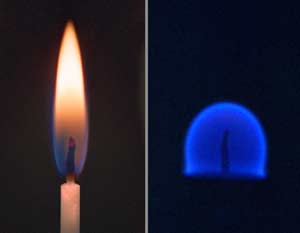Why not fire itself off?
Normally, the process of generating CO2 and water vapor, are substances that are incapable of maintaining combustion. These substances will envelop the fire,

Flame in the usual attractive environment
(Photo: msfc.nasa)
Prevent it from contacting the air. So, the flame must be turned off right from the start of its formation?
But why didn't that happen? Why does the burning process continue without stopping when storing unburnt fuel? The only reason is, the gas after warming will expand and become lighter . Therefore, hot products of combustion do not stay where they are formed (directly near the fire), but get cold and heavier by new air, pushing up quickly.
Here, if Acsimet's law is not applied to the gas (or, if there is no gravity), then any fire will only burn for a moment and will turn itself off immediately. In a weak, attractive environment, the fire will have a very odd shape.
We can easily see the harmful effects of fire products on fire. You often accidentally use it to turn off the fire in the lamp. How often do you blow off kerosene lamps? You blow from the top down, that is, down to the fire, the products are not flammable (due to burning), and the fire is off because there is not enough air.
- How was the old man against 'Ms. fire'?
- Things to know about the Fire - The difference between people and things
- Correct response when suddenly caught fire
- The mechanism of 'fire hose'
- This great invention is the solution to save hundreds of people in the sea of fire
- China launched the first fire train
- Australia's ultra-simple fire-fighting system
- Why can the alarm system sound when there is no fire?
- Vases can fire in a split second
- Invent a new type of fire extinguisher by sucking fire into a fire extinguisher
- Using fire to put out the fire like?
- Stab the fire with a loudspeaker
 'Fine laughs' - Scary and painful torture in ancient times
'Fine laughs' - Scary and painful torture in ancient times The sequence of numbers 142857 of the Egyptian pyramids is known as the strangest number in the world - Why?
The sequence of numbers 142857 of the Egyptian pyramids is known as the strangest number in the world - Why? History of the iron
History of the iron What is alum?
What is alum?